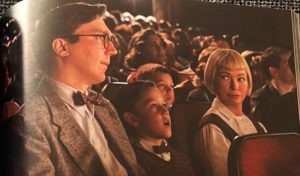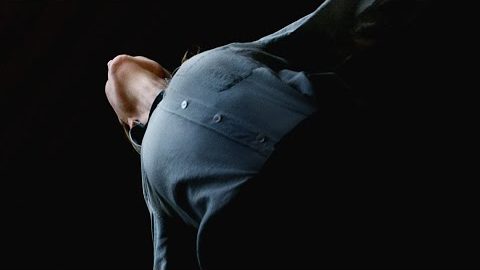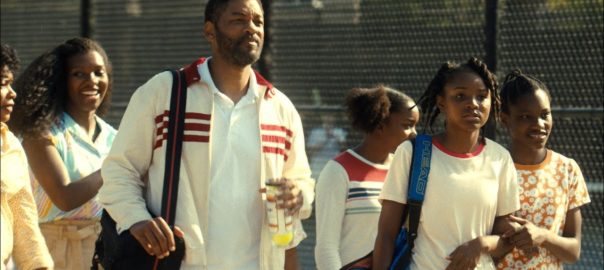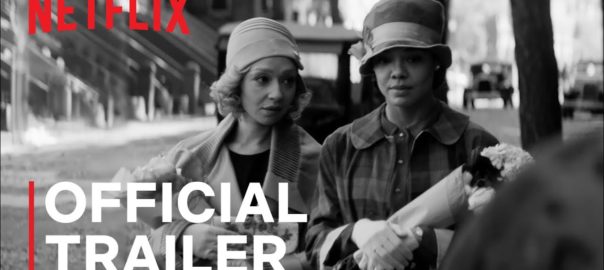
With cooling weather finally having taken hold, and the heat of the summer season soon to be but a fond memory, today VanRamblings will set about to preview the always provocative cinematic season of serious import, the fall film festival season
As we discover each September, autumn is the season for all of our senses.
The feel of cooler temperatures after a long summer. A warm, visually pleasing palate of reds, oranges and browns. The taste of pumpkin spice in everything.
The sound of crunching leaves underfoot.
The smell of woodsmoke.
Like spring, autumn is a season of transition, a reminder of the value of change, in this case from a bright, buzzing, verdant summer of picnics in the park, towards the darker, quieter, more redolent calm of autumn and winter. It’s a journey inward; first experiential, then intellectual, delving into the collective unconscious.

“Autumn light is the loveliest light there is,” wrote author Margaret Renkl. “Soft, forgiving, it makes all the world an illuminated dream.”
In a cinephile’s world, dreams come to the fore in the fall through the release of films which will take on Oscar importance in the winter season to come.
Telluride, Venice, Toronto, New York each early autumn introduce the films which will fill our film consciousness over the many months yet to come.

The first of the important later summer film festivals occurs amidst the mountain landscape of Telluride, Colorado, which locale will be overrun with cinéastes over September’s Labour Day weekend, where prestige filmmakers ranging from Canada’s Sarah Polley (Women Talking), Luca Guadagnino (Bones and All), Sam Mendes (Empire of Light), Alejandro G. Inarritu (Bardo), Todd Field (TÁR), Sebastian Leilo (The Wonder), and Scott Cooper (The Pale Blue Eye) are set to garner the most buzz among the film cognoscenti, each of these filmmakers recipients of much past Oscar glory, each film highly anticipated, each film Oscar bound.
Overlapping the Telluride Film Festival is the 79th annual Venice International Film Festival, the Biennale Cinema, which will run from Wednesday, August 31 thru Saturday, September 10, where many of the films débuting at Telluride stateside will also feature in the star-studded Venice locale.
The big buzz film in Venice this year is White Noise, Noah Baumbach’s first film since Marriage Story. White Noise is a zany adaptation of Don DeLillo’s seminal novel about a Hitler Studies professor (Adam Driver) and his beleaguered wife (Greta Gerwig) whose lives are threatened by a toxic event.
Also at Venice: Andrew Dominik’s evocative drama Blonde, starring Ana de Armas as Marilyn Monroe, who disappears into the role as she struggles to cope under the glare of the spotlight. Add Bobby Cannavale as her second husband, Joe DiMaggio; Adrien Brody as her third husband, Arthur Miller; meticulous production design & luminous cinematography, and you have a potential awards-season juggernaut, streaming on Netflix Sept. 28th.
Olivia Wilde’s psychological chiller, Don’t Worry Darling, sees Florence Pugh and Harry Styles embody a picture-perfect ’50s couple whose unbridled passion for one another turns to suspicion when the former begins to fear that something sinister lurks beneath their carefree existence. Prepare for jump scares, glorious interiors, and Chris Pine as the film’s menacing mastermind.

A TIFF programme screen capture of Steven Spielberg’s autobiographical film, The Fabelmans
As the Telluride and Venice festivals wrap, the film festival season focus will turn to a renewed Toronto International Film Festival (TIFF), now in its 47th season, running from Thursday, September 8th through Sunday, September 18th, as TIFF marks a return to its pre-pandemic days of in-person screenings, after two scaled-down editions spent in hybrid mode the past couple of years.
The big buzz film débuting in Toronto this year is Steven Spielberg’s The Fabelmans, which will have its world première at this fall’s TIFF, with the iconic Oscar-winning director attending TIFF for the first time ever.
A long-in-the-works semi-autobiographical film, The Fabelmans is described by producers as a “deeply personal portrait of 20th-century American childhood,” which focuses on a family based in post-Second World War-era Arizona, the film following the young Spielberg facsimile Sammy Fabelman (played by Gabriel LaBelle) as he grows up with his father (Paul Dano), mother (Michelle Williams) and uncle (Seth Rogen). After discovering a “shattering family secret,” Sammy dives into the wonder of cinema to cope and find a path forward.
With a screenplay by regular Spielberg collaborator Tony Kushner (Munich, Lincoln, and last year’s West Side Story), The Fabelmans is Spielberg’s latest shot at awards-season glory. The film’s première represents a huge coup for TIFF.

The New York Film Festival has lined up titles from Kelly Reichardt, Claire Denis, Alice Diop, Joanna Hogg, and more for its Main Slate this year. Women directed or co-directed 13 of the 32 Main Slate films, amounting to about 41%.
The NYFF has returned to the city that never sleeps for its 60th year at the Lincoln Centre, which recently announced Laura Poitras’ new documentary, All the Beauty and the Bloodshed, to serve as the festival’s Centerpiece film. A story about art, politics, addiction, and David v. Goliath battles, the documentary chronicles the life of photographer Nan Goldin and her fight to hold the Sackler family accountable for their role in the opioid epidemic.
Mia Hansen-Løve’s latest, the Léa Seydoux-starring romantic drama One Fine Morning, is also part of the Main Slate, as are Claire Denis’ Stars at Noon; Kelly Reichardt’s Showing Up; Joanna Hogg’s The Eternal Daughter; Alice Diop’s Saint Omer; Charlotte Wells’ Aftersun; and Marie Kreutzer’s Corsage.
Another Oscar bound film? Clemency director Chinonye Chukwu’s Till, a biopic about the lynching of Emmett Till, and his mother’s pursuit of justice.

As has been the case since it’s inception 41 years ago, the NYFF runs in tandem with the Vancouver International Film Festival, our somewhat truncated festival set to run from from Thursday, September 29th through Sunday, October 9th.
The importance of festivals to culture and society cannot be underestimated, as they set about to provide empathetic insight into our often confusing world. Film festivals also provide the opportunity to switch off your everyday life, to become enmeshed in the lives of people from across the globe.











